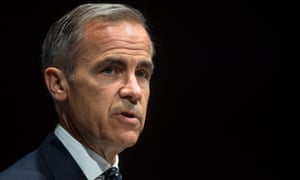
Investment funds of the sort run by Neil Woodford need closer scrutiny to lessen the risk that fire sales of assets trigger a market-disrupting feedback loop, the governor of the Bank of England has said.
Mark Carney used a speech in Tokyo to reveal that Threadneedle Street was to stress test the investment funds industry to reduce the threat of a system-wide financial crisis.
The governor did not name Woodford, who earlier this week blocked investors from taking cash from his flagship £3.7bn equity income fund, but made it clear by a reference to “niche managers” that the Bank recognised the need to expand the scope of its oversight.
Hours after he spoke, stock market announcements showed Woodford selling stakes in some of his largest listed investments as part of efforts to raise cash. He sold about a quarter of his stakes in the beleaguered construction group Kier and the property investment business NewRiver REIT. He still owns about 16% of each business.
He also sold a fifth of his holding in the doorstep lender Provident Financial, and now has a stake of just over 18%.
Woodford has been criticised for a series of bad bets including on the online estate agent Purplebricks, whose shares have slumped 70% over the last 12 months. He has now cut his stake by more than two percentage points to 21.5%. It was his second sale of Purplebricks shares in two days. When the fund was gated he owned nearly 29%. He has also reduced his holding in Card Factory from 10% to less than 5%.
Carney said earlier: “Over half of investment funds have a structural mismatch between the frequency with which they offer redemptions and the time it would take them to liquidate their assets.
“Under stress they may need to fire sell assets, magnifying market adjustments and triggering further redemptions, a vicious feedback loop that can ultimately disrupt market functioning.”
Nicky Morgan, the chair of the House of Commons Treasury select committee, called on Woodford to stop levying management feeson the fund while investors were prevented from withdrawing their cash.
“Investors in the Woodford fund have been locked out of accessing their cash. Yet it has been reported that Mr Woodford is taking in nearly £100,000 in management fees a day,” the Conservative MP said.
“The suspension of trading has provided Mr Woodford with some breathing room to fix his fund. He should afford his investors the same space and waive the fund’s fees while the fund is suspended.”
Morgan also said the gating of Woodford’s fund was a troubling episode that the committee would query at evidence sessions with the Bank of Englandand the City watchdog, the Financial Conduct Authority.
Carney said banks were now a lot safer as a result of the tightening up of supervision that followed the 2008 financial crash, but that the value of assets under management had increased in recent years from $50tn (£39tn) to $80tn, with most of the growth coming from investment funds.
He said two-thirds of investment funds with structural mismatches were domiciled in the US and Europe, and that it was important to ensure – as with banks – that funds were not taking excessive risks.
The authorities were beginning to consider policy tools to guard against the buildup of systemic risks in financial institutions other than banks, Carney said. “System-wide stress simulations are currently being developed, including at the Bank of England, to assess these risks.”
He told the Institute of International Finance that investment flows to emerging markets, where both returns and risks are higher, had increased over the past decade.
“These flows are particularly flighty, reflecting the fact that more than $30tn of global assets are held in investment funds that promise daily liquidity to investors despite investing in potentially illiquid underlying assets, such as emerging market economy [EME] debt.
“We have recently seen analogous situations in the UK within some niche managers and smaller markets, such as open-ended property funds investing in commercial real estate. The complications would be much greater if a major asset class like EME debt were to freeze up.”
Woodford’s fund will be suspended for at least 28 days, but Andy Parsons, the head of investments at The Share Centre, said there was already speculation about a wave of redemptions and an investor “rush for the exit” once the period was up.
[“source=theguardian”]
